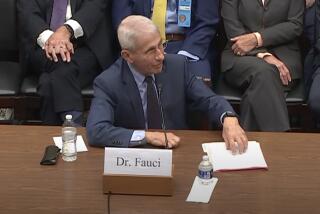Halls-a-Poppin’ : Crisis Brings a Rare Hubbub to Capitol Hill
- Share via
WASHINGTON — In December, the back rooms and byways of Capitol Hill usually are nearly deserted, while the lawmakers are at home or on vacation.
This week, however, the Hill resembles a three-ring circus, with Congress and the media out in full force to provide the public with a gripping portrait of an Administration in crisis.
In one House office building, near where the Richard M. Nixon impeachment sessions took place more than a decade ago, the jam-packed public hearing into the Iran- contras connection drew nearly 200 reporters and television crewmen. Dozens of reporters and technicians--ranging from local radio reporters to one journalist from Iraq--were turned away and had to watch the drama unfold like the home audience--on TV sets in a room down the hall.
Few Members Missing
Only a handful of the 42 members of the House Foreign Affairs Committee stayed away from the televised hearings, and many of them roamed the halls afterward, in hopes of being cornered by a reporter eager for a quotation or a television cameraman looking for juicy sound bites.
“It’s like the showdown at the OK Corral,” said Rep. Robert K. Dornan (R-Garden Grove), describing Tuesday’s exchanges between the lawmakers and Vice Adm. John M. Poindexter and Marine Lt. Col. Oliver L. North, the two former National Security Council staff members at the center of the controversy. Expressing sympathy for their decision to invoke the Fifth Amendment, Dornan added: “So far, it’s Naval Academy 2; Congress 0.”
One congressional staff member trying to track down her boss was told where Rep. Benjamin A. Gilman (R-N.Y.) could be found: “He’s standing in the middle of that pile (of reporters) over there.”
Even some lawmakers who will not be returning to Congress next year--such as Reps. Michael D. Barnes (D-Md.) and Ed Zschau (R-Palo Alto)--sought moments in the limelight.
Poindexter Coaxed to Talk
Barnes, who lost a bid for a Senate seat, during the hearings urged Poindexter to risk going to jail and go ahead and describe his role in the diversion of profits from arms sales to Iran to the Nicaraguan rebels:
“The worst thing that could happen to you is you might be found guilty of one of the many crimes that your counsel are trying to research,” Barnes told Poindexter. “And, frankly, my judgment is . . . that you’d have a very short, probably suspended sentence.”
With that, Poindexter’s attorney, Richard Beckler, was shouting his objections into his microphone.
“For Mr. Barnes to take a long leap forward to the end of a trial and say my client might be convicted is nothing less than outrageous,” Beckler said.
Republican committee members burst out with cheers and applause, and Barnes quickly apologized.
Senate Waiting Game
On the other side of the Capitol, the closed Senate Intelligence Committee sessions have been besieged by a crowd of reporters for more than a week. As Capitol police attempted to protect the senators from demands for the tiniest morsel of information about the hearings, Sen. Bill Bradley (D-N.J.) felt so sorry for those camped out on the floor near the hearing room Tuesday that he bought a couple of pizzas to feed the huddled masses.
The similarly secret House Intelligence Committee hearings took place in an inaccessible room on the fourth floor of the Capitol. Reporters clustered around the stairways and lurked in hallways, in hopes of catching one of the committee members.
For the small group of witnesses trooping from one committee room to another within a few days, the ordeal clearly had its moments of personal anguish. “Dec. 8 is my wife’s birthday,” former National Security Adviser Robert C. McFarlane testified Monday. He said that he was in London last year on the same date, meeting with Iranian officials. “My wife is getting a little fed up with all this.”
Some Soaps Preempted
For the nationwide audience watching much of the drama on live television, the sacrifices were more trivial. The networks preempted favorite day-time soap operas to broadcast segments of the Foreign Affairs hearings, but they received few complaints.
“We got some calls, but not many,” a CBS spokesman said. “People don’t complain like they used to. They’re aware of what’s going on.”
Despite the frenetic activity of lawmakers, congressional aides and journalists, some observers were unimpressed. Recalling the scene during the Watergate hearings in 1974, Lt. R. L. Curtis of the U.S. Capitol Police told the Associated Press: “People were lined up down the hall, around the corner and outside the building.
“There aren’t nearly as many today,” he added.
Times staff writers Ronald J. Ostrow and Sara Fritz contributed to this report.
More to Read
Get the L.A. Times Politics newsletter
Deeply reported insights into legislation, politics and policy from Sacramento, Washington and beyond. In your inbox twice per week.
You may occasionally receive promotional content from the Los Angeles Times.









